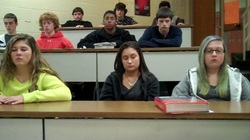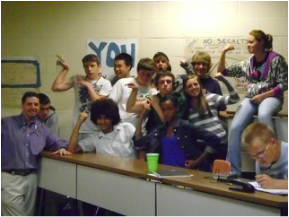 I have been meditating for twenty five years. It is a ritual as important to me as sleeping and eating the right food. One metaphor to describe meditation is to imagine you are looking at birds flitting between tree branches. Birds can be all shapes and sizes doing all sorts of things. Similarly your thoughts may be troubling, neutral or pleasant. When you let something that is troubling you be like another bird in the tree —neither good nor bad—you allow yourself to become free from the intense emotions surrounding that thought. Approaching thoughts this way is very freeing. In the process you can be more objective about the thoughts in your own mind. You will also find yourself making different choices, especially when you are restless or upset. Most teachers would agree that stress and anxiety are a major cause preventing creativity and learning in the classroom. So one day I decided to introduce my students to meditation. I tried it out with my ninth, tenth and twelfth graders. I asked my students to come into the room, take their books out and simply sit there quietly. They had this time to themselves. Time to arrive and relax. I told them scientific studies have shown that sitting still and doing nothing is good for clearer thinking, improving attention deficit disorders and managing stress. I emphasized that for this to work they could not interfere with any other student in the process. They were thrilled. After some experimentation, it soon became obvious that five minutes was too long for some students - especially those with ADHD, ADD. I felt torn as I did not want some students to be disadvantaged by meditation. We persisted over the next few months. I called our meditation time Sink and Think Meditation Snacks. Since I introduced Sink and Think™ , my students looked forward to meditating and appreciated quiet time. Most surprising of all, those students who struggled with ADD and ADHD, loved it most . I noticed subtle shifts in my students after a short time.There was more respect between them, they listened more intently and they began engaging more in the lesson. The students themselves described their experiences as: “there's less chaos in this class”; “I feel peaceful as I enter your room”; “I am not overwhelmed when I start to work”; “I am curious what the lesson will be”; “I took 3 seconds off my personal best by meditating before the swim meet”… and the list goes on. Sink and Think™, has been a transformative classroom experience. It has impacted both me and my students, revealing the intrinsic value that silence brings. Respect, care, curiosity, creativity, self-confidence and self-management are just a few. Perhaps the most remarkable thing I have noticed is that students who suffer from ADHD become calmer and more attentive throughout the lesson. If you would like more information about how silence affects learning contact me here. Please share this blog with someone who needs to hear good news.
0 Comments
 What do I mean by organic teaching? I mean teaching that responds to the living breathing souls in the classrooms - the students. It is an authentic and natural teaching that the teacher dares to bring into the classroom. Organic teaching requires a teacher to be awake, alert and empathic. The kind of teaching a student remembers for the rest of their lives. Unfortunately organic teaching has become a rare event in schools. The business of schooling is more than ever interested in exam results. The single pointed focus on exam results is arguably the greatest misrepresentation of a teacher's effectiveness and a student's intelligence. So what could organic teaching look, sound and feel like? It takes me back to a hot, muggy day in 2012 when I was teaching. What do you do as a teacher when the temperature is a muggy 90 degrees outside and your lethargic students have just eaten lunch? I peruse my room. Students are slumped over their desks barely able to stay awake. My carefully planned lesson seems strangely alien in this atmosphere of reluctance. The vision of students struggling enthusiastically to solve challenging problems is fading as I take in the panorama of sleepy minds and bodies in front of me. An overwhelming wave of futility washes over me. I gaze around the room desperately looking for a natural opening. Unfortunately, there is a force field of inertia so thick that, I feel like I am talking through wet cement. My words fall on deaf ears and wooden desks. I stop and wait quietly. Several students prop open one eye to make sure I am still there. My natural opening just arose. I turn my back silently on my students and write a quote on the board: "I think, therefore I am." Then I write the question "What would happen to space if the co-ordinate (3,6) went missing?" Gently, ever so gently, I state: “Today is our last Wednesday together and it is NOT a coincidence that we should be doing THIS question on the board.” Three or four heads pop up and stare vacantly at the question. There is more silence, until one student mumbles, “What’s the coincidence?” His jet black eyes are hidden under long bangs. “Aah” I think, “he’s awake!” Two more heads pop up like prairie dogs looking for predators. I answer quietly and slowly: “I haven’t worked that part out yet”? More voices contribute unexpectedly throwing out unlikely conjectures. “Well one co-ordinate has a 3 and Wednesday is the third day of the week!” says one student at the back of the room, beaming with satisfaction. Another chimes in that “the combination of co-ordinates (3,6) adds to 9 which is the number of letters in Wednesday”. Suddenly over half the bodies in the hot, muggy, depressive room are awake and squawking like chicks in a nest. “Where is this enthusiasm coming from?” I wonder. My mission is to awaken the rest of the class to wonder and want to explore with me. Raising my voice I ask “Do you realize how lucky you are to have a classroom ? In some countries, students walk 10 miles to school to stand or sit under a tree. No books, no shelter, and a long walk home.” There is a stirring. I feel like a preacher on a pulpit as I rhetorically declare and ask “Do you realize less than two percent of the entire planet’s population know what a Cartesian Number Plane is and even fewer understand how to create graphs?” Heads are popping up curiously. “Do you know that if the co-ordinate (3,6) was missing you would not be able to have video games?” Only two heads remain down. "How come?" says one student. Unexpectedly a student blurts out "Because computer pixels are co-ordinates on a number plane. We are making progress. “There is still time” I think to myself, “we will get through this”. I savor the moment. “Do you realize co-ordinate number planes are only 300 years old?” I ask in an excited tone. “Hurrr?” mumbles someone. “Yes!” I claim exuberantly. “Descartes thought this out while he was eating eggs at a restaurant in Paris. He wrote it down on his napkin! He was so excited he forgot to tip the waitress. Can you imagine how she felt, while one of the greatest moments in mathematical history was unfolding?” Everyone is awake, alert and curious! One blurts out "I thought the Mayans already knew this?" I was reaching them now. I had them! “No” I said delightedly at his wonderful input, “the Mayans invented zero! But without zero the number plane would be meaningless.” I ask the same student "What is the significance of zero in the Cartesian number plane?" With the Mayans and Descartes at my side I am surfing the interest and learning with my students. We complete the problem with relish. The rest of the lesson unfolds as we learn and practice the distance formula. There is a buzz in the room and as students work together I am delighted to hear their conversations and imaginations alive and well. The students are alive with that peculiar energy that appears from nowhere. I ponder the lesson's aftermath in my hot, muggy room, wondering "What are the special ingredients that make it possible for students and the teacher to mysteriously come together?" If you enjoyed this post please forward it to a friend. Click to set custom HTML How do you feel about your education? Do you find some teachers “have it” and others don’t?
Most importantly have you ever asked yourself "How do I learn best?" Answering this question alone may reveal why some teachers light you up and others shut you down. The ancient Greek maxim "Know Thyself" still applies today. Because once you know yourself you will know what you need in order to learn. You see, every student has very particular needs in order to learn. That includes you. Let's start with the obvious. You have eyes, ears, mouth and a body. These are your major learning organs which determine your dominant learning style. In other words how you like to learn best. They are called:
To believe that the above learning styles are the only way you learn would be inaccurate. You learn through all three modalities at the same time. Can you imagine how difficult it would be to learn if you sat through an entire lesson with your eyes closed, or your ears blocked or sitting absolutely still? There are other ways that might help you to know yourself and learn. Ask yourself "How important is it for me to learn by:"
Once you have asked yourself these questions start to notice which teachers include these qualities in their lessons and how it affects you. Ask your friends which teachers they like and why. Lastly ask yourself what could my teacher do differently that would make me a happier student? Think about how and when you can ask your teacher so the teacher realizes you are serious about how much this would help you learn better. Don't express it as a complaint or ultimatum. This never works and most likely will create more discomfort between you and your teacher. I suggest you practice this with a good friend, your coach, a parent or someone you trust first. For more information to help you know your learning styles I recommend you read “Quantum Learning: Unleashing the Genius in You” or my blogs (see below). You can also hire a Teen Coach to help you understand your learning styles. Good luck and pass this blog not your parents, friends and teachers. Other BLOG Posts by Lawrence Carroll |
Archives
September 2016
Testimonial: |
LAWRENCE CARROLL EDUCATIONAL CONSULTANT & LIFE COACH
|
About Lawrence Carroll
Bio Writings Testimonials Contact Location: Berkshire County MA Call (413) 212 2030 |
"Lawrence Carroll's workshop on personal stress management, which he conducted with my Columbia Grad School class
was a huge success." Neal Pilson, Columbia University, Former President, CBS Sports |

 RSS Feed
RSS Feed